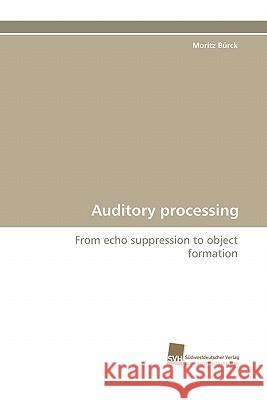Auditory Processing » książka
Auditory Processing
ISBN-13: 9783838122014 / Angielski / Miękka / 2010 / 144 str.
The auditory system retrieves, categorizes, and processes relevant information in a complex superposition of acoustic signals. Two processing steps are of special importance and hence subject of the present book: Echo suppression and auditory-object formation. Echo suppression is dealt with by a mathematical analysis of an optimal model derived from a general framework of optimal stimulus reconstruction. We relate the ensuing model to biological and technical strategies and, as a consequence, present new possibilities for both. In the context of auditory object formation, frequency decomposition in the cochlea as well as amplitude modulation are a means of categorizing signal components. The latter is therefore treated by an in-depth analysis of four possible neuronal archetype models. The analysis quantifies limitations and potentialities of neuronal identification of amplitude modulation and periodicity in general.
The auditory system retrieves, categorizes, and processes relevant information in a complex superposition of acoustic signals. Two processing steps are of special importance and hence subject of the present book: Echo suppression and auditory-object formation. Echo suppression is dealt with by a mathematical analysis of an optimal model derived from a general framework of optimal stimulus reconstruction. We relate the ensuing model to biological and technical strategies and, as a consequence, present new possibilities for both. In the context of auditory object formation, frequency decomposition in the cochlea as well as amplitude modulation are a means of categorizing signal components. The latter is therefore treated by an in-depth analysis of four possible neuronal archetype models. The analysis quantifies limitations and potentialities of neuronal identification of amplitude modulation and periodicity in general.











